
DEPRESSION
WHAT IS DEPRESSION?
Depression in men is often more than just feeling sad or blue, however, men are usually unaware, or do not recognize what is happening. Changes in work, family, and relationships are areas of men’s lives that are frequently associated with depression; e.g.
Do you feel pressured at work? Are relationships different? Is there never enough time in the day to complete your tasks? Do you lack energy and feel tired all the time? Are you run down?
Problems can begin with demanding expectations from your employer; pressure due to a high or increasing workload or maybe a promotion into a new position/role. Others may feel stressed from being stuck in the same old job, are burnt out, and are not even aware that there is a problem. Work performance may deteriorate such as being unable to complete tasks on time or at the same level, missing important meetings, or getting negative feedback from employers.
Changes in relationships and friendships are also important as they can be a source of problems.
This could include a birth or loss of a child resulting in additional pressure at home. Other stressors can come from the start of a new relationship, an affair whilst in a relationship, or the end of a relationship. These changes can be with a partner, wife, de facto, other family members, close friends, and sometimes colleagues.
It may result in less time spent with these people, withdrawing from them and the world, and wanting to spend more and more time alone.
A reduction or stopping of physical activity is a common problem in men who are depressed. This can include hobbies and any regular exercise such as running, swimming, gym, walking, and many other activities.
A common reason for this is that they are waiting to feel better before doing any physical activity. However, this doesn’t happen and instead it gets worse and worse.
Other men tend to report that if only they can get over this cold/flu/physical illness everything will be ok. The only problem is that it never seems to get any better and physical symptoms just keep dragging on week after week, month after month.
With all the above issues, help is available.
This doesn’t always mean that someone is depressed, they just happen to be common problems men with depression tend to experience.
DIFFERENT TYPES OF DEPRESSION
The below list covers some but not all types of depression. Symptoms of depression can range from relatively minor (but still disabling) to very severe.
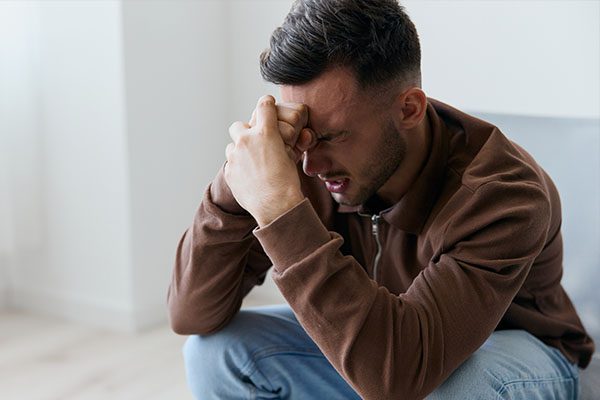
Major Depression/Clinical Depression
Major Depression or Clinical Depression is the more severe type of depression where the symptoms interfere with the ability to work, sleep, study, eat, and enjoy life. Major Depression is marked by a depressed mood most of the day, particularly in the morning, and a loss of interest in normal activities and relationships; symptoms that are present every day for at least 2 weeks.

Melancholia Depression
Melancholia Depression is a classic form of biological depression. It is a term used to describe a severe form of depression where many of the physical symptoms of depression are present. One of the major changes is that the person can be observed to move more slowly. The person is also more likely to have a depressed mood that is characterized by a complete loss of pleasure in everything, or almost everything.
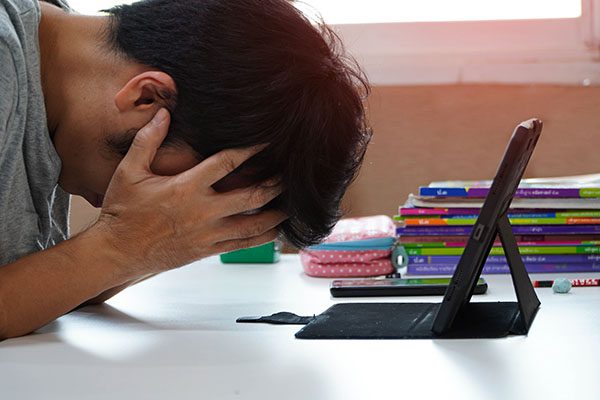
Non-melancholic Depression/Situational Depression
Non-melancholic Depression is associated with psychological causes and is very often linked to stressful events in a person’s life, and/or in conjunction with the individual’s personality style. This type of depression can occur when someone is having trouble managing a stressful event in their life, such as a death in the family, divorce, or losing a job.
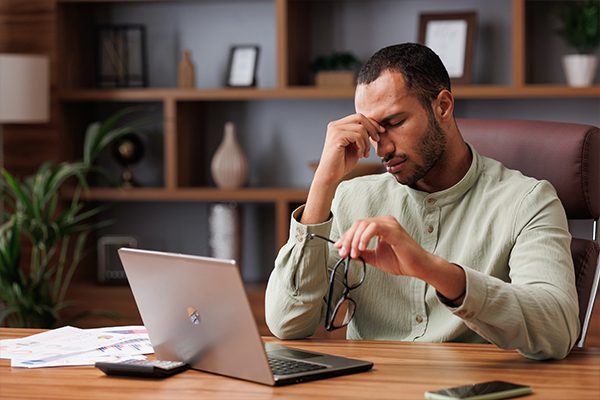
Persistent Depressive Disorder (Dysthymic disorder)
The symptoms of Persistent Depressive Disorder are similar to those of major depression but are less severe. However, in the case of Persistent Depressive Disorder the symptoms last longer. A person has to have this milder for more than two years to be diagnosed with persistent depressive disorder.
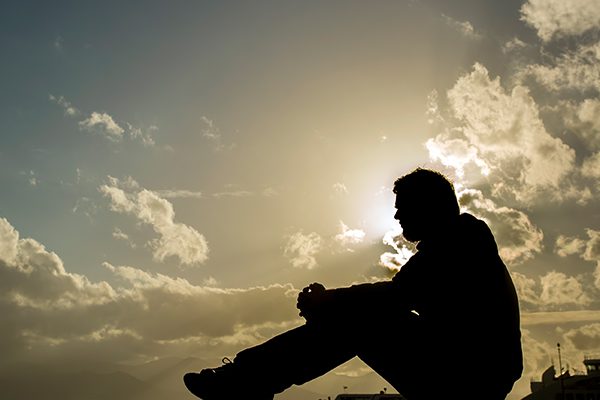
Seasonal Affective Disorder (SAD)
Seasonal Affective Disorder is a type of depression that has a seasonal pattern that is characterized by the onset of depression during the winter months when there is less natural sunlight. A person with Seasonal Affective Disorder is more likely to experience lack of energy, sleep too much, overeat, gain weight and crave carbohydrates. SAD also generally lifts during spring and summer. SAD is very rare in Australia and is more likely to be found in countries with shorter days and longer periods of darkness, such as in the cold climate areas of the Northern Hemisphere.

Bipolar Disorder
Bipolar Disorder used to be known as ‘manic depression’ because the person experiences periods of depression and periods of mania, with periods of normal mood in-between. Mania is the opposite of depression and can vary in intensity; symptoms include feeling great, having lots of energy, having racing thoughts and little need for sleep, talking fast, having difficulty focusing on tasks, and feeling frustrated and irritable.
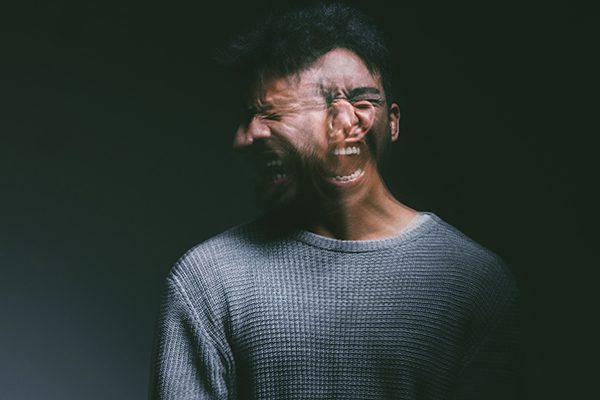
Atypical Depression
Atypical Depression is different from the usual persistent sadness experienced with typical depression. In contrast, Atypical Depression is associated with improved mood when something positive happens. Other symptoms of this type of depression include increased appetite, sleeping more than usual, feeling of heaviness in your arms and legs, and oversensitivity to criticism.
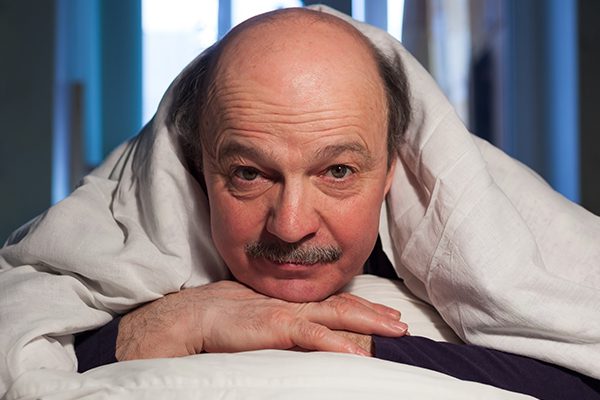
Male Hormonal Depression/Testosterone-Deficiency Depression
This type of depression is associated with the male aging process and can sometimes occur in men during their 30s, 40s, or 50’s as their body’s production of testosterone may begin to slow. This gradual decline can produce symptoms such as erectile dysfunction, decreased libido, increase in irritability, feeling tired, difficulty with concentration and memory loss, and sleep problems.
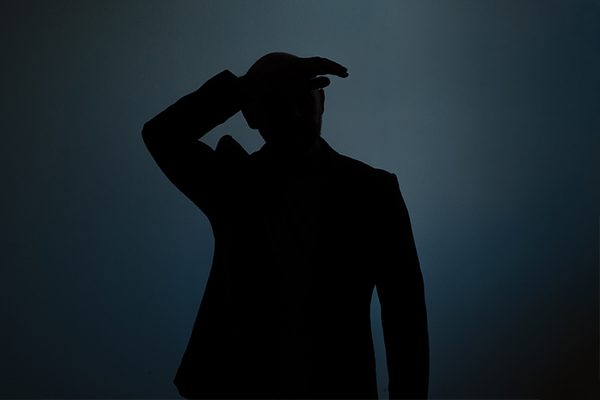
Male Depressive Disorder/Covert Depression
Men are less likely to show more typical signs of depression such as sadness. Depression in men may cause them to keep their feelings hidden. Instead of expressing a depressed mood, they may seem more irritable and aggressive. Men are more likely to recognize and describe the physical symptoms of depression (such as feeling tired or losing weight) than women.
Men may acknowledge feeling irritable or angry, rather than saying they feel low. Depressed men will often lose interest in work, sports, sex, going out, or other things they used to enjoy. Other behaviours in men that could be signs of depression, but are not recognized as such, include escapist behaviour, such as spending a lot of time at work or on sports; alcohol or substance abuse; controlling, violent or abusive behaviour; irritability or inappropriate anger, and risky behaviour, such as reckless driving.
WITH ALL THE ISSUES, HELP IS AVAILABLE.
IF YOU ARE INTERESTED PLEASE CONTACT DR EIDE TO ARRANGE AN APPOINTMENT.

Dr Peter Eide has extensive experience in psychological treatment mainly with adolescent and adult men that have depression, anxiety and addiction, though he also works with women.We can help you feel better.
LINKS
CONTACT US
412 Mt Alexander Rd Ascot Vale Vic 3032
If You Are Suicidal Or In A Crisis Please Call 000 Or Lifeline On 13 11 14
0450 446 788
PAYMENT
Fees are much lower than the recommended fee set by The Australian Psychological Society of $280 for a 46–60-minute consultation.




Visit Us
412 Mt Alexander Rd Ascot Vale Vic 3032
Call Us
0450 446 788
DEPRESSION
WHAT IS DEPRESSION?
Depression in men is often more than just feeling sad or blue, however, men are usually unaware, or do not recognize what is happening. Changes in work, family, and relationships are areas of men’s lives that are frequently associated with depression; e.g.
Do you feel pressured at work? Are relationships different? Is there never enough time in the day to complete your tasks? Do you lack energy and feel tired all the time? Are you run down?
Problems can begin with demanding expectations from your employer; pressure due to a high or increasing workload or maybe a promotion into a new position/role. Others may feel stressed from being stuck in the same old job, are burnt out, and are not even aware that there is a problem. Work performance may deteriorate such as being unable to complete tasks on time or at the same level, missing important meetings, or getting negative feedback from employers.
Changes in relationships and friendships are also important as they can be a source of problems.
This could include a birth or loss of a child resulting in additional pressure at home. Other stressors can come from the start of a new relationship, an affair whilst in a relationship, or the end of a relationship. These changes can be with a partner, wife, de facto, other family members, close friends, and sometimes colleagues.
It may result in less time spent with these people, withdrawing from them and the world, and wanting to spend more and more time alone.
A reduction or stopping of physical activity is a common problem in men who are depressed. This can include hobbies and any regular exercise such as running, swimming, gym, walking, and many other activities.
A common reason for this is that they are waiting to feel better before doing any physical activity. However, this doesn’t happen and instead it gets worse and worse.
Other men tend to report that if only they can get over this cold/flu/physical illness everything will be ok. The only problem is that it never seems to get any better and physical symptoms just keep dragging on week after week, month after month.
With all the above issues, help is available.
This doesn’t always mean that someone is depressed, they just happen to be common problems men with depression tend to experience.
DIFFERENT TYPES OF DEPRESSION
The below list covers some but not all types of depression. Symptoms of depression can range from relatively minor (but still disabling) to very severe.

Major Depression/Clinical Depression
Major Depression or Clinical Depression is the more severe type of depression where the symptoms interfere with the ability to work, sleep, study, eat, and enjoy life. Major Depression is marked by a depressed mood most of the day, particularly in the morning, and a loss of interest in normal activities and relationships; symptoms that are present every day for at least 2 weeks.

Melancholia Depression
Melancholia Depression is a classic form of biological depression. It is a term used to describe a severe form of depression where many of the physical symptoms of depression are present. One of the major changes is that the person can be observed to move more slowly. The person is also more likely to have a depressed mood that is characterized by a complete loss of pleasure in everything, or almost everything.

Non-melancholic Depression/Situational Depression
Non-melancholic Depression is associated with psychological causes and is very often linked to stressful events in a person’s life, and/or in conjunction with the individual’s personality style. This type of depression can occur when someone is having trouble managing a stressful event in their life, such as a death in the family, divorce, or losing a job.

Persistent Depressive Disorder (Dysthymic disorder)
The symptoms of Persistent Depressive Disorder are similar to those of major depression but are less severe. However, in the case of Persistent Depressive Disorder the symptoms last longer. A person has to have this milder for more than two years to be diagnosed with persistent depressive disorder.

Seasonal Affective Disorder (SAD)
Seasonal Affective Disorder is a type of depression that has a seasonal pattern that is characterized by the onset of depression during the winter months when there is less natural sunlight. A person with Seasonal Affective Disorder is more likely to experience lack of energy, sleep too much, overeat, gain weight and crave carbohydrates. SAD also generally lifts during spring and summer. SAD is very rare in Australia and is more likely to be found in countries with shorter days and longer periods of darkness, such as in the cold climate areas of the Northern Hemisphere.

Bipolar Disorder
Bipolar Disorder used to be known as ‘manic depression’ because the person experiences periods of depression and periods of mania, with periods of normal mood in-between. Mania is the opposite of depression and can vary in intensity; symptoms include feeling great, having lots of energy, having racing thoughts and little need for sleep, talking fast, having difficulty focusing on tasks, and feeling frustrated and irritable.

Atypical Depression
Atypical Depression is different from the usual persistent sadness experienced with typical depression. In contrast, Atypical Depression is associated with improved mood when something positive happens. Other symptoms of this type of depression include increased appetite, sleeping more than usual, feeling of heaviness in your arms and legs, and oversensitivity to criticism.

Male Hormonal Depression/Testosterone-Deficiency Depression
This type of depression is associated with the male aging process and can sometimes occur in men during their 30s, 40s, or 50’s as their body’s production of testosterone may begin to slow. This gradual decline can produce symptoms such as erectile dysfunction, decreased libido, increase in irritability, feeling tired, difficulty with concentration and memory loss, and sleep problems.

Male Depressive Disorder/Covert Depression
Men are less likely to show more typical signs of depression such as sadness. Depression in men may cause them to keep their feelings hidden. Instead of expressing a depressed mood, they may seem more irritable and aggressive. Men are more likely to recognize and describe the physical symptoms of depression (such as feeling tired or losing weight) than women.
Men may acknowledge feeling irritable or angry, rather than saying they feel low. Depressed men will often lose interest in work, sports, sex, going out, or other things they used to enjoy. Other behaviours in men that could be signs of depression, but are not recognized as such, include escapist behaviour, such as spending a lot of time at work or on sports; alcohol or substance abuse; controlling, violent or abusive behaviour; irritability or inappropriate anger, and risky behaviour, such as reckless driving.
WITH ALL THE ISSUES, HELP IS AVAILABLE.
IF YOU ARE INTERESTED PLEASE CONTACT DR EIDE TO ARRANGE AN APPOINTMENT.

Dr Peter Eide has extensive experience in psychological treatment mainly with adolescent and adult men that have depression, anxiety and addiction, though he also works with women.We can help you feel better.
LINKS
CONTACT US
412 Mt Alexander Rd Ascot Vale Vic 3032
0450 446 788
If You Are Suicidal Or In A Crisis Please Call 000 Or Lifeline On 13 11 14
PAYMENT
Fees are much lower than the recommended fee set by the Australian Association of Psychologists of $315 for a 50+ 60-minute consultation.


